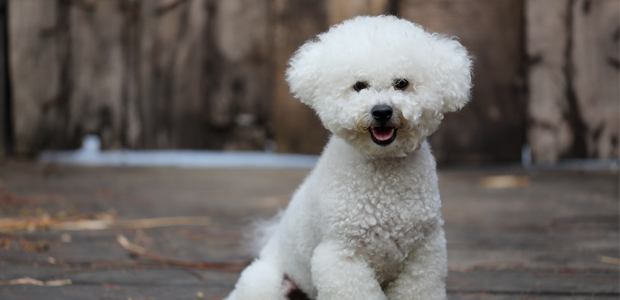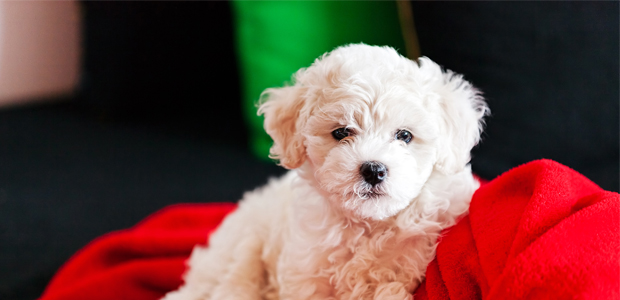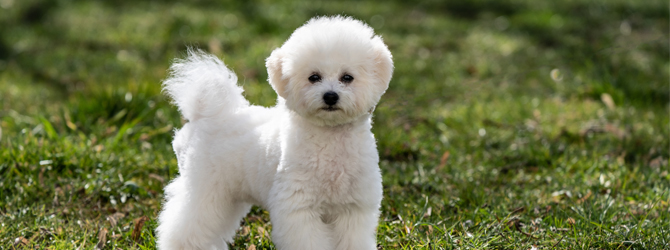The Bichon Frise: is it the right breed for you?
Bichon Frises are playful, cheerful dogs that make for great companions. They are a lively breed known for their fluffy white coat.
They were originally bred as performing dogs, starring in circus shows. Nowadays, Bichons make for great family dogs who are comfortable living in most environments.
Bichon Frise Summary:
- Originally bred as performing dogs
- Spiralled, silky, snow-white coat
- Life expectancy for a Bichon Frise = 12 - 15 years
- Average size = 23 – 30 cm
- Average weight = 3 – 5 kg
- Estimated monthly cost = Medium
- Exercise needs = Low
- Attention needs = Medium
- Sociability = Medium
Please note: A dog’s exercise, training/stimulation and grooming requirements can depend on several factors such as age and health. The same goes for ongoing costs of ownership. For advice on one specific dog, we always advise chatting with a vet.
How much exercise does a Bichon Frise need?
Your Bichon Frise will need between 30 minutes - 1 hour of exercise per day. As they don’t require lots of walking, they are a popular choice with busy families and older owners.
To keep them happy and healthy, take them to a secure environment where they can run off-lead, with lots of interesting things to see and sniff.
Bichon Frise dietary requirements
Your Bichon Frise will need a balanced diet rich in nutrients, vitamins, and minerals. It’s best to feed them complete dog food specially formulated for small breeds to ensure that they are getting the right amount of vitamins and nutrients.
Growing pups may prefer 3-4 smaller servings during the day, rather than two larger meals. This can be reduced to two meals a day as your dog gets older.
The recommended portion size will depend on your individual dog. You’ll need to take into account their activity level, age and metabolism. To avoid weight gain, make sure your Bichon Frise has a healthy and balanced diet and gets plenty of exercise.
For dietary advice that’s specific to your dog, have a chat with your local vet or the breeder you’re purchasing your puppy from.

Training: how to train a Bichon Frise
Highly intelligent dogs with a history in performing, Bichons love learning new tricks. They are fast learners and respond well to training, picking up commands quickly. Due to their obedience, some owners train their Bichons to compete in agility competitions. This activity can help you build a strong bond with your Bichon Frise.
Bichon Frises are a social breed and enjoy human interaction and playing with other dogs. They will benefit from socialising from an early age and attending puppy socialization classes.
As is the case with all breeds, Bichons will start to approach new experiences with caution when they are around 12 weeks old. Therefore, it’s really important for their development that they experience as many different situations as possible before they reach this milestone.
Whilst they are still so young and receptive, it's a good idea to introduce your Bichon Frise to other dogs, people and livestock as well as car travel and unfamiliar noises, such as traffic.
If they are introduced to being left alone for small periods from an early age, Bichons should be fine at home on their own.
Grooming: do Bichon Frises shed?
Thanks to their curly coats (which catch shorter hairs as they moult) Bichons don’t shed as much as other dog breeds.
The Bichon Frise needs to be groomed regularly to prevent knots and tangles. A daily brush is a great way to make sure their skin and coat stays in tip-top condition, as well as providing an opportunity to bond with your dog.
Alongside a daily brush, they will benefit from professional grooming every month or so, as their coats are quite high maintenance. Grooming also removes fur from their ears, which improves air flow and reduces the risk of ear infections.
Complete your Bichons grooming routine with regular tooth brushing, nail clips and ear checks.
Cost of owning a Bichon Frise
When considering the lifetime cost of owning a Bichon Frise, remember to take into account the following costs:
- Dog food
- Veterinary care
- Pet insurance
- Kennels or dog sitters
- Regular dog grooming costs
- Toys and equipment
- Preventative healthcare
As a rough guide, allow between £80 and £90 a month to cover the ongoing costs of owning a Bichon Frise. Our vets have drawn up this handy guide to save dog owners money.
Are Bichon Frises prone to any health problems?
The Bichon Frise is prone to certain health problems, just like all breeds. This doesn’t mean your dog is guaranteed to contract any particular disease – it’s just something to bear in mind.
To keep your Bichon Frise as healthy as possible, monitor them closely and attend routine 6-month health checks with your vet. This will allow the vet to give your dog a thorough check-up and to pick up on minor (often symptomless) conditions before they have a chance to escalate into something worse.
Possible health complications for Bichon Frise include:
- Canine dental issues and gum disease
- Infections
- Obesity and weight problems in dogs
- Allergies (including flea, food and pollen)
- Eye problems
Before welcoming a new dog into your household, make sure you’re able to cover the costs of any routine or emergency medical treatment they may need. Pet insurance will help massively with this. Why not ask your vet about their recommended pet insurance policy?

Bichon Frise temperament, socialising and ideal home environment
Bichon Frises are affectionate, sociable dogs that love to be around people. They get on with children and usually get on well with other pets if they are introduced to them from a young age.
They can sometimes greet new arrivals by barking, but this behaviour can often be managed with training and socialization.
Thanks to their small size, Bichons don’t need vast amounts of space in which to roam, so they are perfectly happy in smaller homes and apartments providing their exercise needs are met.
Are Bichon Frises suitable for first time owners?
Bichon Frises are a great choice for first time owners. Gentle dogs, bichons adapt to most environments and have a friendly nature. They like to experience new things and will pick up training and commands quickly.
Bichons have fairly low exercise needs, so they aren’t as big of a commitment when it comes to exercise. You won’t have to spend hours walking them, so they should fit in with most modern lifestyles.
Need more info?
For more info on finding the best dog breed for you and your lifestyle, have a chat with your vet. Find your nearest vet using our Find a Vet page, or speak to a vet online using Online Vets.

